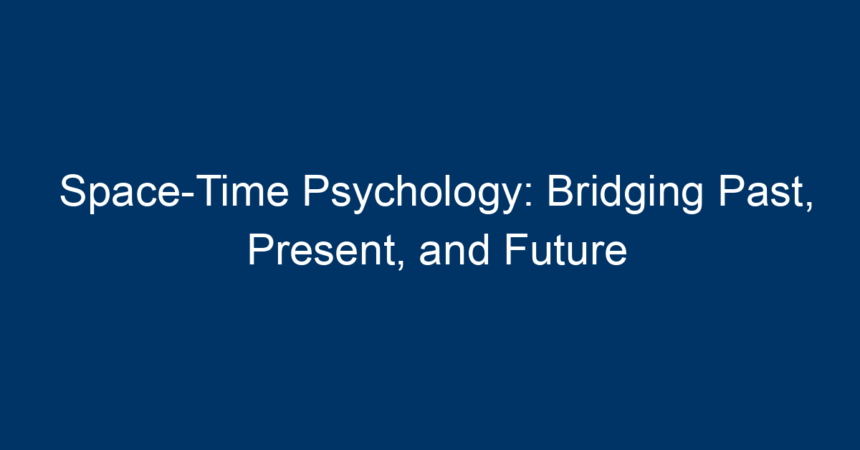Introduction
In an age where the complexities of human experience are increasingly intertwined with scientific advancements, the concept of space-time psychology emerges as a compelling framework. This innovative approach examines how our perceptions of time and space affect our thoughts, emotions, and behaviors. As we navigate through life, the interplay between our past experiences, present circumstances, and future aspirations shapes our psychological landscape. This article explores the facets of space-time psychology, illustrating how understanding this relationship can lead to improved mental well-being and decision-making.
The Concept of Space-Time Psychology
Understanding Space-Time
At its core, space-time psychology merges principles of psychology with concepts from physics, particularly those introduced by Einstein. While traditional psychology often focuses on linear time—viewing experiences as a sequence of events in a straight line—space-time psychology recognizes that our memories, present realities, and future goals coexist within a more complex framework.
The essence of this approach lies in understanding that our past influences our present and future, much like how the dimensions of space influence each other. Our emotional state, cognitive processes, and choices are shaped by this intertwining of time and space, offering plausible explanations for behaviors that may otherwise seem irrational.
Psychological Implications
Understanding how space and time interact within our minds can illuminate various psychological phenomena:
-
Memory Recall: Research shows that memories are not merely recorded in a linear fashion. Instead, they’re influenced by our current emotional context and future expectations. Space-time psychology posits that recalling a memory might evoke feelings related to both the past event and our present mindset.
-
Decision Making: Our perception of time can affect the choices we make. Those who are more future-oriented may prioritize long-term consequences over immediate gratification, leading to healthier lifestyle choices. Conversely, individuals focused on past experiences might struggle with regret, impacting their decision-making.
- Mental Health: Conditions like depression and anxiety often stem from unhealthy relationships with time—being stuck in the past or overly worried about the future. Space-time psychology offers insights into these challenges and can guide therapeutic practices.
Bridging the Past, Present, and Future
The Role of Memories
Past Experiences
In space-time psychology, our past is not merely a series of events but a reservoir of experiences that inform our identity and decision-making processes. Understanding how memories shape our perceptions can empower individuals to reframe their narratives. Therapeutic approaches such as narrative therapy encourage clients to view their past not as a burden but as a canvas upon which to paint their future.
Present Awareness
The present is where we experience life firsthand. Practicing mindfulness techniques can help anchor individuals in the here and now, fostering greater emotional regulation and cognitive clarity. Being present allows us to filter past experiences and future worries through a lens of awareness. Incorporating mindful practices can enhance mental well-being and improve interpersonal relationships.
Future Aspirations
Forward Planning
In space-time psychology, the future is not merely a point in time; it’s a collection of possibilities influenced by our present state and past experiences. Setting intentions and visualizing future goals can create a mental roadmap that guides decision-making. Techniques such as visualization can harness the brain’s capacity to anticipate and prepare for future challenges.
Goal Setting
Effective goal setting is deeply informed by an understanding of one’s relationship with time. Utilizing frameworks like SMART (Specific, Measurable, Achievable, Relevant, Time-bound) can enhance clarity and direction. Moreover, recognizing how past failures or successes influence our confidence can provide valuable insight into setting achievable objectives.
Practical Applications of Space-Time Psychology
Therapy and Counseling
Integrating space-time psychology into therapeutic practices can revolutionize how psychologists approach mental health. Therapists can guide clients to explore their past traumas, present emotional states, and future aspirations, helping them find coherence in their experiences. Techniques such as cognitive-behavioral therapy (CBT) and acceptance and commitment therapy (ACT) can be enhanced with space-time principles, allowing clients to process their emotions holistically.
Workplace Dynamics
In professional settings, understanding space-time psychology can enhance team dynamics and productivity. Employers can foster a culture of awareness by encouraging employees to reflect on past successes and future goals. Workshops on time management can incorporate psychological insights, helping individuals balance immediate tasks with long-term aspirations.
Personal Development
Individuals can leverage space-time psychology for personal growth. Journaling about past experiences, current feelings, and future goals can create a comprehensive self-portrait that aids in self-discovery. Engaging in regular reflection can help individuals identify patterns in their behavior and decision-making, guiding them toward more productive choices.
The Science Behind Space-Time Psychology
Neuropsychological Insights
Recent advancements in neuroscience have illuminated how the brain processes time and space. Studies indicate that our brains construct timelines for memories, allowing us to navigate our lives as cohesive narratives. Research also shows that certain neural pathways may be activated depending on whether we’re focusing on past, present, or future experiences, offering fascinating insights into how space-time psychology operates at a biological level.
Theoretical Frameworks
Various psychological theories intersect with space-time psychology, including:
-
Temporal Self-Appraisal Theory: This theory posits that individuals evaluate their present self against their past selves, influencing self-esteem and self-perception.
- Prospective Memory Research: Investigating how individuals remember to perform future tasks can clarify our temporal focus and improve organizational skills.
Cultural Perspectives
Cultural attitudes toward time also influence space-time psychology. In individualistic societies, future orientation and planning are often emphasized, while collectivist cultures may prioritize communal experiences and past traditions. Understanding these cultural differences can enhance interpersonal relationships in diverse settings.
Conclusion: Actionable Insights
Understanding space-time psychology offers a pathway to deeper self-awareness and enhanced mental health. By recognizing the interplay between our past, present, and future, we can foster a more coherent narrative of our experiences. Here are some actionable insights to apply this framework in your life:
-
Reflect Regularly: Set aside time for journaling or meditation to examine past experiences and future aspirations. This can help identify patterns and enhance decision-making.
-
Practice Mindfulness: Engage in mindfulness exercises to ground yourself in the present, reducing anxiety related to the past or future.
-
Set Clear Goals: Use the SMART framework to structure your goals, ensuring they are informed by your past experiences and future aspirations.
-
Embrace Therapy: Consider integrating space-time psychology principles in therapeutic settings to explore the interconnectedness of your memories, emotions, and future plans.
- Foster a Growth Mindset: Approach challenges as opportunities for growth, understanding that your past does not dictate your future.
By embracing the principles of space-time psychology, we can navigate the complexities of human experience with greater understanding and empowerment, paving the way for a more fulfilling life.




